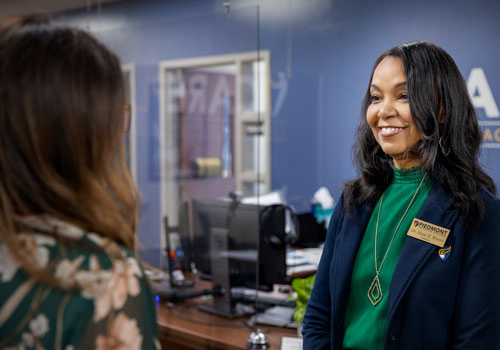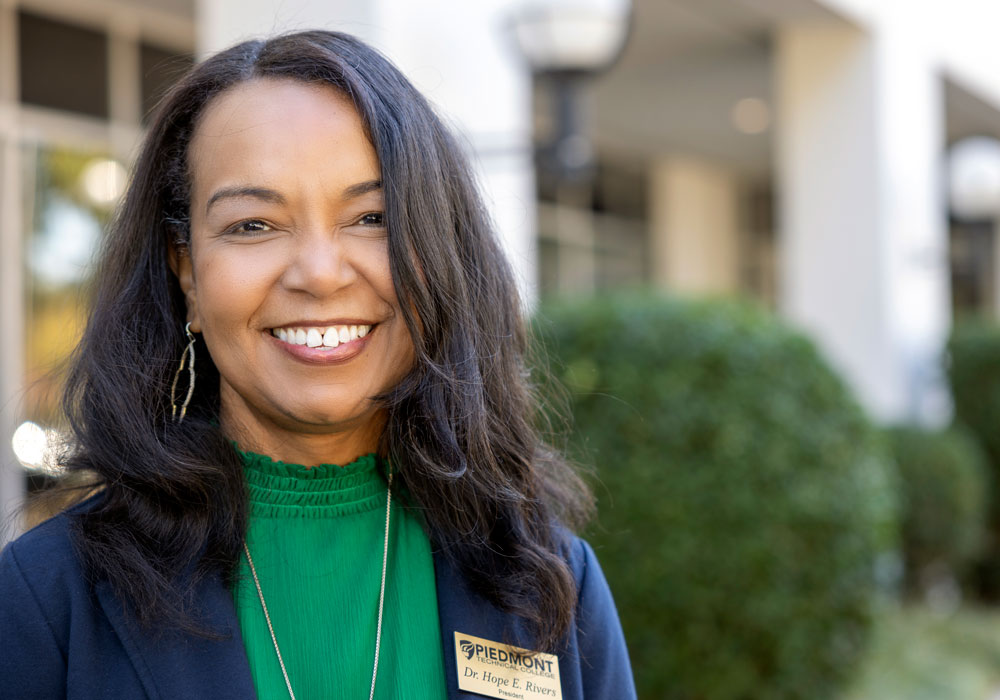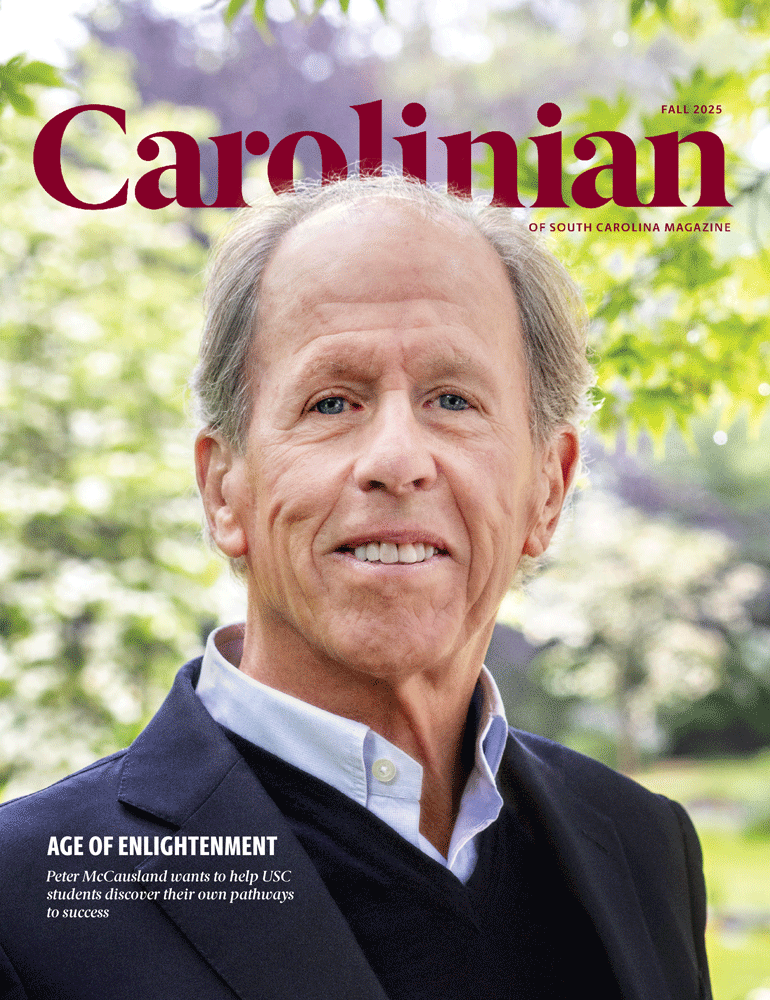Hope Rivers could be the poster child for the value of education, the importance of mentorship, the necessity of empathy. The first Black female president of Piedmont Technical College, she also understands the experience of the many first-generation, low-income college students on campus.
After all, Rivers was once a first-gen college student herself — at the University of South Carolina.
“Their story is my story, too,” says Rivers, who now oversees an eight-campus system that serves seven South Carolina counties. “I always remind myself of what it felt like to be that student at the university, not understanding what college was all about and trying to figure it out.”
Rivers grew up in Whitmire, South Carolina, a tiny town in Newberry County. After graduating from high school in a class of 40 students, she chose to attend USC, saying it was a natural fit for her family: “We were Gamecocks. That was our team of choice.”
At USC, she found teachers who noticed her, guided her, questioned her and encouraged her. She listened and learned from each of them.
There was Ruth Strickland, an English instructor who suggested she pursue an English degree: “Being a first-generation college student, I didn't understand what I was going to do with an English degree if I really didn't want to be a high school English teacher. She was the first person to say to me, ‘You're going to need a master's degree and you will likely need a Ph.D.’”
There was Shirley Mills Bannister, who worked in government relations at USC and advised her how to present herself in the workplace: “She felt comfortable enough with say to me, ‘When you go to this event, you want to make sure that you are dressed appropriately. You never know who you might see; you never know who might be interested in you.’ And that is the thing I say to my students all the time now: Be prepared. Be ready. You have to be prepared to shoot your shot when it's time.”
“Their story is my story, too. I always remind myself of what it felt like to be that student at the university, not understanding what college was all about and trying to figure it out.”
And then there was the TRIO program, which offered its own community on campus, with smaller classes and hands-on guidance to first-generation college students. Rivers even worked in TRIO after she earned her undergraduate degree in 1994 office while earning her master’s in education, which she completed in 1996.
She went on to the S.C. Technical College System, which represents 16 colleges across the state, and worked her way up the ranks: curriculum coordinator, associate vice president and vice president of academic affairs, executive vice president. She was nudged to earn her Ph.D. by a member of the technical college system’s board.
“I remember one gentleman saying to me, ‘If you really want your seat at the table, you're going to have to have that ticket,’” she says. “That really permeated with me because some would have thought, ‘Golly, that's negative. I'm smart, I'm bright. I don't need the ticket.’ But I thought to myself, well, isn't that kind of him to just be honest and say, ‘If you want to position yourself well, get what's needed in order to be at the table.’”
Rivers would go on to earn her third degree from USC— a doctorate in higher education administration in 2010, completed while she was working full time, teaching as an adjunct professor and having a full life as a wife and mom. She learned how to juggle, and to understand stress. She also learned about priorities.
“People would ask me all the time, ‘Don't you want to be a president?’ For me, it was about timing,” she says. “I had learned enough from some of my mistakes with being a mom and going to school for my Ph.D. and doing all of those things at the same time that the timing had to be right for me to be a president. My family came first.”
But when her oldest daughter was a senior in high school, and her youngest daughter was headed to middle school, she received a call from the president of Piedmont Tech: He was planning to retire.
“He said there was absolutely no pressure for me to do anything with that information,” she says. “But he had said before, ‘I think you need to consider being a college president.’ And so, at that time, it just resonated with me. It was like, if not now, then when? If not me, then who?”

A onetime first-generation college student, Hope Rivers connects to Piedmont Tech students with similar life experiences.
So she put her name in the hat. She understood the job and believed she could do it well. She relished the opportunity to work with a wonderful staff. But there was a more personal motive, too.
“I knew that I would have an opportunity to cover my hometown,” she says. “I knew that if I was so fortunate to get the job that Newberry County would be part of my service area. We have a seven-county service area and I'm familiar with these small towns. That just mattered to me.”
She also knew she would be able to connect with — and have the chance to inspire — the students she would serve.
“There is no silver bullet,” she says. “There's no magic, just some hard work, some grit, some professionalism, some being intentional. Those are the things that really come into play for me, and those are things that I know that young people have. We just have to pull it out of them and allow them to make mistakes. They don't have to be perfect.”
She has found that her success resonates with the people who matter the most to her – those who helped her get where she is today, plus those she is helping take their next step. And the results of her efforts are reflected in PTC’s enrollment, which was up 22 percent in summer 2022 and up 17 percent from the previous fall.
She says Piedmont Tech is working to reach people who may not have thought higher education was for them, or others who had to leave school to take care of their families or tend to other responsibilities. “We are just bringing them back into the fold,” she says.
That accessibility and affordability are key to the technical college system’s mission: “We’re open access so we meet you where you are. We don’t turn anyone away. Now, can you major in anything? Well, no. We want to make sure that your skillset and your academic abilities line up with a path that you're going down, but you're not going to get a rejection letter.’”
Now in her second year at the helm, Rivers knows she is in the right place.
“I feel like I've kind of walked into my calling and I'm doing what I was born to do,” she says. “I have stressful moments like anyone else, but I'm always reminded of the student that I'm helping. I always try to remember myself; I try to remember young Hope, walking on campus, and how did that feel? That gives me the energy to get out there and do the things that are important.”

